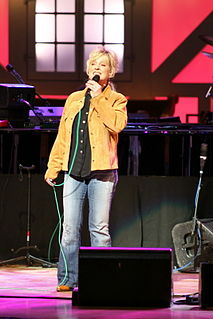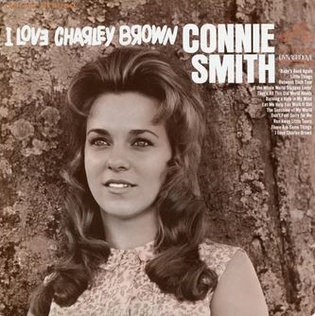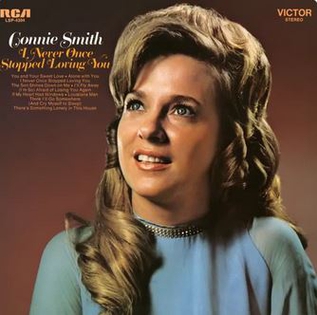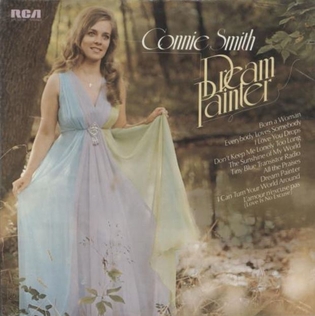
Connie Smith is an American country music singer and songwriter. Her contralto vocals have been described by music writers as significant and influential to the women of country music. A similarity has been noted between her vocal style and the stylings of country vocalist Patsy Cline. Other performers have cited Smith as influence on their own singing styles, which has been reflected in quotes and interviews over the years.

Downtown Country is a studio album by American country singer Connie Smith. It was released in January 1967 via RCA Victor Records. It was the sixth studio album released in Smith's career and featured 12 tracks. Downtown Country was the second of Smith's albums to include string instrumentation to help create a pop-influenced sound. The album also featured the single "The Hurtin's All Over", which reached the top five of the Billboard country chart. The album itself reached the top five of Country LP's chart following its initial release.

The Best of Connie Smith is a compilation album by American country singer Connie Smith. It was released in September 1967 via RCA Victor and featured 12 tracks. The disc was Smith's first compilation project released in her career and featured her most popular singles made commercially successful between 1964 and 1967. It also featured one new recording titled "I'll Come Runnin'". Penned by Smith herself and released as a single, the song became a top ten hit on the American country songs chart in 1967.

Soul of Country Music is a studio album by American country singer Connie Smith. It was released in December 1967 via RCA Victor and contained 12 tracks. The disc was Smith's ninth studio album released in her career and included mostly covers of previously-recorded songs. It received mixed reviews from critics following its release and reached the top ten of the American country albums chart.

I Love Charley Brown is a studio album by American country singer Connie Smith. It was released in April 1968 via RCA Victor and featured 12 tracks. It was the tenth studio disc issued in Smith's career and reached the top 20 of the American country albums chart. The album was described as a collection of pop-inspired country songs. Included were four cuts written by Smith's longtime songwriting collaborator, Dallas Frazier. Among his cuts was one of the album's three singles, "Run Away Little Tears". Along with Frazier's cut, the two additional singles included reached the top ten of the American country songs chart. The album was met with favorable reviews from critics.

Sunshine and Rain is a studio album by American country singer Connie Smith. It was released in October 1968 via RCA Victor and included 12 tracks. The disc marked the eleventh studio collection released in Smith's career and her tenth with RCA Victor. Sunshine and Rain featured an assortment of both new material and covers of songs by other country artists. The album reached the top 40 of the American country albums chart and received a favorable review from Billboard magazine following its release.

Young Love is a studio album by American country artists Connie Smith and Nat Stuckey. It was released in July 1969 via RCA Victor and contained 12 tracks. The project was a collection of duets between Smith and Stuckey. The duets were mostly cover versions of songs previously recorded by other country artists. Many of these songs had originally been released as duets themselves. Included on the project was the pair's cover of "Young Love", which became a top 20 single on the American country songs chart. In 1969, Billboard gave the album a favorable response.

Back in Baby's Arms is a studio album by American country singer Connie Smith. It was released in October 1969 via RCA Victor and contained 11 tracks. It was the fourteenth studio album released in Smith's career and her thirteenth solo album. The disc contained a mixture of both new recordings and cover versions of previously-recorded material. Back in Baby's Arms reached the top 20 of the American country albums chart in 1969 and received a four-star rating from AllMusic.

Sunday Morning with Nat Stuckey and Connie Smith is a studio album by American country artists Nat Stuckey and Connie Smith. It was released in January 1970 via RCA Victor and contained 11 tracks. The disc was a collection of country gospel songs performed as duets by both artists. It was the pair's second album together as a duet team and the first of religious music. Among the album's recording was the song "If God Is Dead ". Released as a single, the song charted in the top 60 of the American country chart in 1970. The album received a positive review from Billboard magazine following its release. In 2002, the album was re-released under the title God Will and included a twelfth track.

The Best of Connie Smith Volume II is a compilation album by American country singer Connie Smith. It was released in March 1970 via RCA Victor and contained ten tracks. It was the second "Best Of" compilation released by the RCA Victor label that featured Smith's musical output. The disc compiled Smith's most popular singles between 1967 and 1969. The album reached the top 30 of the American country albums chart following its release. Also included was two new recordings. Of these new recordings, one was released as a single in 1969. Titled "You and Your Sweet Love", it reached the top ten of the country singles chart.

I Never Once Stopped Loving You is a studio album by American country singer Connie Smith. It was released in September 1970 on RCA Victor and contained ten tracks. It was the sixteenth studio album of Smith's career and was considered a traditional country project. The collection mixed original material with covers of previously-recorded songs. Three singles were included on the album: "You and Your Sweet Love", the title track and "Louisiana Man". Both "You and Your Sweet Love" and the title track reached the top ten on the American country songs chart in 1970. The album itself charted in the top 20 of the American country LP's survey. Billboard magazine gave the LP a positive response following its original release.

Where Is My Castle is a studio album by American country singer Connie Smith. It was released in January 1971 via RCA Victor and contained ten tracks. The album was described as a set of a traditional country songs and were considered to be autobiographical of Smith's life at the time. The disc's title track was released as a single in 1970 and reached the top 20 of the North American country charts. The album itself would chart in the top 40 of the American country LP's chart. Following its release, Billboard magazine gave it a positive review.

Just One Time is a studio album by American country singer Connie Smith. It was released in June 1971 via RCA Victor and contained ten tracks. It was Smith's eighteenth studio album released in her career and her second of 1971. The album was named for the lead single of the same name, which reached the top five of the North American country charts in 1971. The album itself would chart in the top 20 of the American country LP's chart following its release. Additionally, Billboard magazine gave the project a positive reception when reviewing it in 1971.

Come Along and Walk with Me is a studio album by American country singer Connie Smith. It was released in October 1971 via RCA Victor and consisted of ten tracks. The project was Smith's nineteenth studio album and the third collection of gospel songs. The disc included original songs and covers of songs first cut by other artists. Among the song included on the project were three by gospel performer Dottie Rambo. Following its release, Billboard gave the album a positive review.

Ain't We Havin' Us a Good Time is a studio album by American country singer Connie Smith. It was released in April 1972 on the RCA Victor label and was her twentieth studio album. The project contained a total of ten tracks which were considered to have a "thicker seventies" sound, according to one biographer. Included on the album was Smith's single, "Just for What I Am". It became a top five single on the North American country songs chart while the album itself reached the American country LP's top 25. Ain't We Havin' Us a Good Time received a favorable review from Billboard magazine following its release.

"If It Ain't Love" and Other Great Dallas Frazier Songs is a studio album by American country singer Connie Smith. It was released in July 1972 via RCA Victor and contained ten tracks. It was the twenty first studio album of Smith's career and was a collection of songs composed by songwriter Dallas Frazier. Three of these songs were duets between Smith and Frazier himself. The album's title track was spawned as a single in 1972 and reached the top ten of the American country chart. The album itself reached the top 20 of the American country LP's chart and it received a positive review from Billboard magazine.

Love Is the Look You're Looking for is a compilation album by American country singer Connie Smith. It was released in February 1973 via RCA Victor and contained ten tracks. It was Smith's third compilation released by the RCA Victor label and mostly included previously-recorded material. The album was issued following Smith's exit from RCA's roster. It was named for its title track, which became a top ten single on the North American country singles charts. The album itself would chart on the American country LP's chart in 1973.

Dream Painter is a compilation album by American country singer Connie Smith. It was released in July 1973 via RCA Victor and contained ten tracks. The album was released following Smith's departure from RCA Victor and contained previously-released material. Two new recordings were also featured, including the title track. Released as a single, the title track would reach the top 30 of American country songs chart. The album itself would chart the American country LP's chart in 1973.

Connie Smith Now is a compilation album by American country singer Connie Smith. It was released in July 1974 and consisted of ten tracks. The album was one of several compilations that was released after Smith departed from the RCA Victor label. Most of the album's material compiled songs Smith recorded during her years with the label, including the singles, "Louisiana Man" and "I'm Sorry If My Love Got in Your Way". The album charted on the American country LP's chart and received a review from Billboard magazine following its release.

A Lady Named Smith is a studio album by American country singer Connie Smith. It was released in May 1973 via Columbia Records and contained 11 tracks. It was the twenty second studio album released in Smith's career and her first with the Columbia label. The album's production and style featured a string instrumentation to help market Smith in the pop field. Included were a mix of new material and covers of previously-recorded songs by other artists. The album's only single was the original tune, "You've Got Me ", which reached the American country songs chart in 1973. A Lady Named Smith would also chart on the American country albums chart in 1973.




















